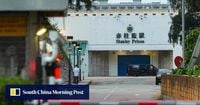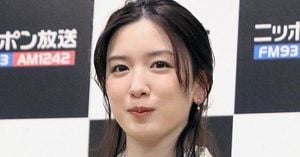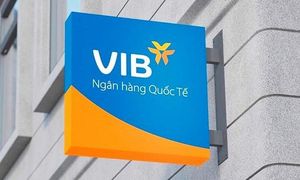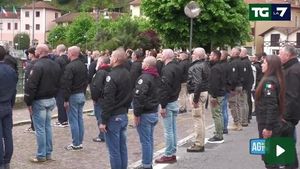Four former pro-democracy lawmakers in Hong Kong have been released from prison after serving time for their involvement in an unofficial 2020 primary election. Claudia Mo, Gary Fan, Jeremy Tam, and Kwok Ka-ki were the first group of 45 democrats to be discharged from prison in the early morning of Tuesday, April 29, 2025, after being sentenced in the city’s largest national security trial, which concluded in November.
Mo was released from the Lo Wu Correctional Institution, while Fan left Lantau’s Shek Pik Prison. Tam and Kwok, former leading members of the disbanded Civic Party, were discharged from Stanley Prison. According to an HKFP journalist on the scene, police barred the media from waiting for Fan at the main entrance of Shek Pik Prison. Members of the press had to wait on a bridge near Shek Pik Reservoir, overlooking the facility. At 5:39 AM, a seven-seater vehicle left the prison, followed shortly by another private vehicle and a taxi. The private vehicles had curtains, with Fan believed to be in one of them.
Police set up a cordon on the bridge to prevent journalists from chasing after the vehicles. The other three democrats left their respective detention facilities in the early hours of Tuesday under similar arrangements, according to local media reports. HKFP has reached out to the Correctional Services Department for confirmation.
Local media outlet HK01 captured Fan on video when he arrived at his residence in Tseung Kwan O. The ex-legislator said, "I am going home to reunite with my family now. Thanks for the care from Hong Kong people and the media," as he headed home. Local media also visited Mo’s home. Her husband, Philip Bowring, confirmed with reporters that Mo was inside the flat and resting, adding she was “well and in good spirits.” Local newspaper Ming Pao published a photo showing a banner in the living room reading: “Welcome Home Mum.”
The four pro-democracy figures were sentenced to four years and two months in jail after pleading guilty to the charge of conspiracy to commit subversion. Their release came after the court deducted from the sentences the time they had spent in detention since late February 2021, when their police bail was revoked. After being formally brought to court in March that year, the court refused to grant them bail pending trial on national security grounds.
The four were among the defendants who received the shortest prison terms. The longest jail sentence was given to former law professor Benny Tai, who was described as the “mastermind” behind the election plan by three handpicked national security judges presiding over the case. The high-profile case centered on an unofficial primary election held in July 2020 that aimed to help the pro-democracy camp win a controlling majority in the legislature. The judges ruled that the democrats had planned to use their constitutional powers to veto the government budget, ultimately forcing the resignation of the chief executive and a government shutdown. This, they ruled, would have resulted in a “constitutional crisis.”
In the judges’ reasoning for the sentences, Mo, Fan, Tam, and Kwok were given a one-third reduction in jail time for their guilty plea, along with a further three-month discount for their past public service and “ignorance of the law.” Beijing inserted national security legislation directly into Hong Kong’s mini-constitution in June 2020 following a year of pro-democracy protests and unrest. It criminalised subversion, secession, collusion with foreign forces, and terrorist acts – broadly defined to include disruption to transport and other infrastructure. The move gave police sweeping new powers and led to hundreds of arrests amid new legal precedents, while dozens of civil society groups disappeared. The authorities say it restored stability and peace to the city, rejecting criticism from trade partners, the UN, and NGOs.
Gary Fan Kwok-wai, 58, Kwok Ka-ki, 63, Jeremy Tam Man-ho, 49, and Claudia Mo Man-ching, 68, walked out of prison after serving four years and two months behind bars. Fan, accompanied by police, was seen returning to his home in Tseung Kwan O early in the morning after he was freed from Shek Pik Prison on Lantau Island.
Sources had suggested the four, who were sentenced last November and had been in custody since March 2021, would “remain low-key and decline media interviews” after their release. They were among 45 former politicians and activists sentenced for conspiracy to subvert state power under the Beijing-decreed national security law for their involvement in an illegal legislative “primary” election in 2020.
The group, known as the Hong Kong 47, includes some of the most well-known figures of the resistance to the Beijing-led crackdown on the pro-democracy movement in the wake of the 2019 protests. Some, like accused organiser Benny Tai and activist Joshua Wong, had been jailed before on activism charges. For many, including Mo, it was their first offence.
The four released on Tuesday had been given the shortest sentences, reduced for their guilty pleas but still more than four years. Their time held in pre-trial detention was taken into account. Of the 47, 31 pleaded guilty, and two were acquitted at trial. The 14 who were convicted after pleading not guilty were given harsher sentences. The four had been held across three different prisons - Mo at the Lo Wu Correctional Institution, and former legislator Fan at Shek Pik prison. Tam and Kwok, both former senior members of the Civic Party, had been held at Stanley Prison.
Local media reported seeing vehicles believed to be carrying the individuals leaving the various prisons in the early hours of Tuesday, adding that police had set up physical blocks to keep press at a distance and prevent them from following some cars. Fan, speaking to the press when he arrived at his home early on Tuesday, said: “I will go back home and reunite with family. Thank you HongKongers.”
Philip Bowring, Mo’s husband, told reporters he was pleased Mo had returned home, saying she was “well and in good spirits.” But he said she would not give interviews for the time being. “She has to get used to life again in the outside world,” he said at their door, adding that they probably would go to England to see their grandchildren later.
The Ming Pao media outlet reported a banner was seen hanging in the family’s living room reading “welcome home Mum.” Mo, 68, is the founder of the Civic Party and was an outspoken democratic legislator until she and the entire democratic bloc quit in solidarity with colleagues over the disqualification of colleagues. She was denied bail in part because of WhatsApp conversations she’d had with foreign media. In a message on Facebook soon after she was charged, Mo told supporters, “I may be physically feeble, but I’m mentally sturdy … No worries. We all love Hong Kong yah.”
More than 40 members of the group are still in jail, serving sentences of up to 10 years. Tai, a legal scholar accused of being the “mastermind” behind the group’s “subversion,” was given the longest sentence but had faced up to life in prison. The primaries were held in 2020, just days after the national security law (NSL) came into force. The sweeping piece of legislation, imposed by the Chinese government to criminalise acts of dissent, sedition, and foreign collusion, has been widely criticised as a tool of Beijing and Hong Kong authorities to crush political opposition. Its terms were and remain considered vaguely defined. At the time of the primaries, Hong Kong minister Erick Tsang had warned that they could violate the law, but the organisers went ahead. Unofficial primaries had been held in the city before, including by pro-establishment parties. The group aimed to win a majority in Hong Kong’s Legislative Council, or LegCo, and then use it to block bills and force the dissolution of LegCo and the eventual resignation of the chief executive. The three government-selected national security judges overseeing the case found this to be an act of subversion.
The Hong Kong and central Chinese governments have rejected international criticism of the national security law and related prosecutions, saying it was necessary to restore order after the protests which drew millions to the city streets and devolved into violent clashes. Thousands of protesters were arrested, with many still waiting to go through the court system five years later. Police were accused of widespread acts of brutality against protesters and journalists, but the force was cleared of wrongdoing by a controversial inquiry process that found its actions to be justified.




